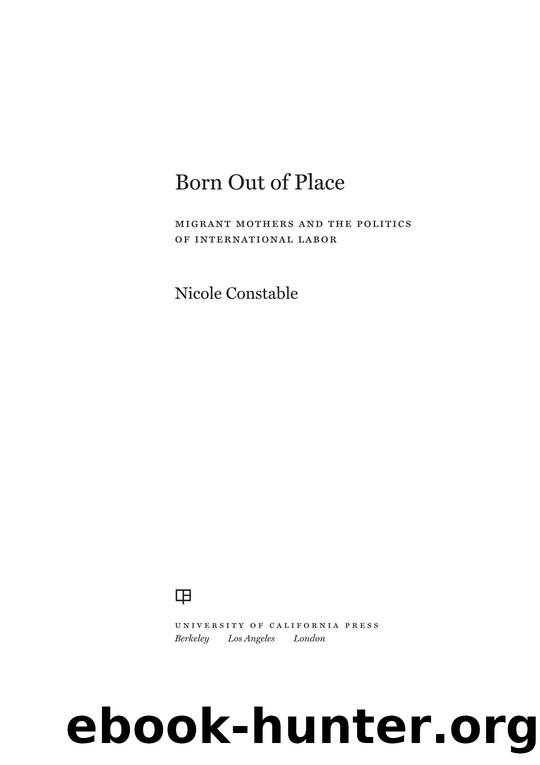Born Out of Place: Migrant Mothers and the Politics of International Labor by Nicole Constable

Author:Nicole Constable
Language: eng
Format: epub
ISBN: 9780520282018
Publisher: University of California Press
MEANINGFUL TERMINOLOGY
Many women spoke of men as âthe fatherâ or âhis/her father.â When asked about their relationships, most Indonesian mothers spoke of their partners as âhusbands,â which implied a long-term commitment and exclusivity (whether or not this was actually the case), or as âboyfriends,â to imply something more ongoing than a one-night stand, with some hope of commitment, even if they later understood that the man viewed the relationship very differently. When I asked an Indonesian woman about the sort of relationship she had with the man she slept with, she answered simply, âIn my country, if married, sleep together; if sleep together, married.â In other words, her sexual relationship was by definition marriage. Like many others, she normally referred to a womanâs partner as her âhusband.â Describing a sexual partner as a husband can retroactively be a claim to respectability. The majority of mothers spoke of sex as if it were inseparable from hopes or expectations of a committed and ongoing relationship with the father, ideally a âmarriage.â
More of the Indonesian women who had white or Chinese partnersâas opposed to African or South Asian onesâspoke of them as âboyfriends.â In some cases, they knew the man was married and unlikely to divorce his wife, but they still hoped for a long-term relationship. As my research progressed, it became clear that, for Indonesian women, âboyfriendâ blurred into a sort of customer, client, or benefactor relationship. In response to my question about terminology, Rianaâa former FDW now married to a Chinese manâonce said, âhusband is really boyfriend and boyfriend is really customer.â
Soliciting for prostitution is illegal in Hong Kong but prostitution itself is not, which helps fuel ambiguities. Men (âboyfriendsâ) like Wilhelm (chapter 4) took Wahyu out, bought her drinks and a meal, brought her home or to his hotel room, and usually gave her âgiftsâ or money. Although he and other men might have seen this as a variation of the money-for-sex âgirlfriend experience,â without the hassle of finding a new woman each time he came to town, women like Wahyu depict this as something qualitatively different from more blatant forms of âprostitutionâ (Bernstein 2007). As a âboyfriendâ he was not a client but someone who cared about her and gave her gifts or money because he wanted to and liked her. Women explained that prostitutes exchange specific sexual acts for defined sums of money (a price). Meeting men at bars, going out with them, sleeping with them for gifts or money, and leaving open the possibility of a long-term relationship was understood or justified as different from prostitution. As one woman explained, âAt certain bars men know there are bad girls. If I need money, I say to him âI like you and I am a bad girl. But Iâm not a prostitute. You just give me what you want to give me.ââ A few women, like Wahyu, entered Hong Kong with FDH contracts but freelanced at bars. Some couples later married, which reinforced the blur between customers or clients and âboyfriendsâ and the fantasy of marriage.
Download
This site does not store any files on its server. We only index and link to content provided by other sites. Please contact the content providers to delete copyright contents if any and email us, we'll remove relevant links or contents immediately.
The Secret History by Donna Tartt(19086)
The Social Justice Warrior Handbook by Lisa De Pasquale(12190)
Thirteen Reasons Why by Jay Asher(8909)
This Is How You Lose Her by Junot Diaz(6886)
Weapons of Math Destruction by Cathy O'Neil(6279)
Zero to One by Peter Thiel(5801)
Beartown by Fredrik Backman(5754)
The Myth of the Strong Leader by Archie Brown(5507)
The Fire Next Time by James Baldwin(5442)
How Democracies Die by Steven Levitsky & Daniel Ziblatt(5218)
Promise Me, Dad by Joe Biden(5153)
Stone's Rules by Roger Stone(5087)
A Higher Loyalty: Truth, Lies, and Leadership by James Comey(4962)
100 Deadly Skills by Clint Emerson(4925)
Rise and Kill First by Ronen Bergman(4788)
Secrecy World by Jake Bernstein(4753)
The David Icke Guide to the Global Conspiracy (and how to end it) by David Icke(4717)
The Farm by Tom Rob Smith(4507)
The Doomsday Machine by Daniel Ellsberg(4490)
